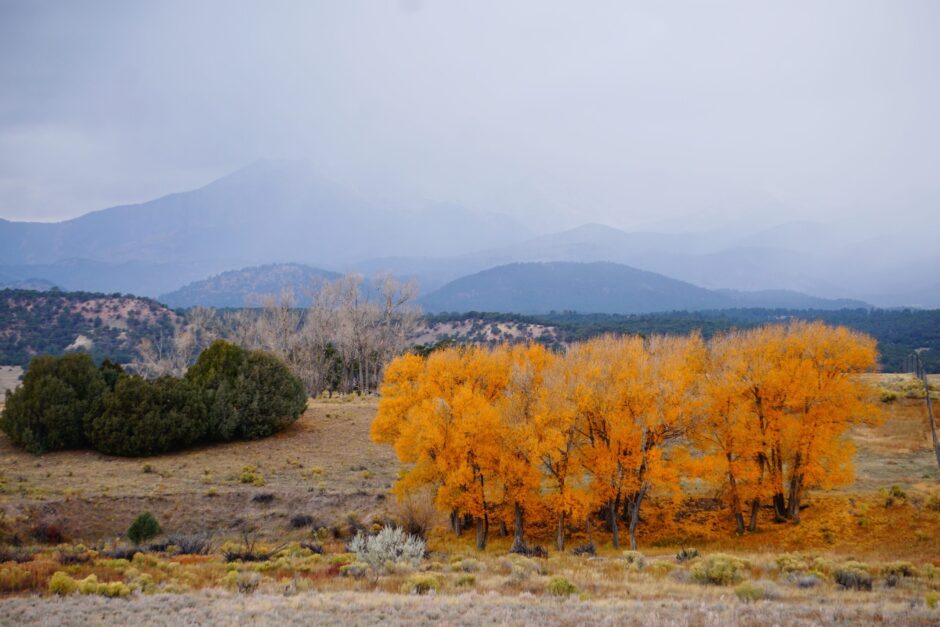So I stumbled upon a book that touches close to home for me, as a naturalist who drags his young daughter with him to various outdoor locales seething with both beauty and danger, filled with the confidence and aplomb that would perhaps be best summed up with the phrase: “It’ll never happen to me.” The book is Stephane Gerson’s nonfiction/memoir Disaster Falls: A Family Story (2017), about a whitewater rafting trip on which he eight-year-old son died. (You can find the New York Times review of it here.)

It’s actually one of my greatest fears: doing something foolish that would result in a child being injured or dying, which is why I wrote my story “Letting the Dog Out” years ago, which is included in my book of stories The White Tattoo (2002). To make a short story even shorter: in “Letting the Dog Out” a man accidentally runs over a child. How could you live with yourself after that? In the particular circumstances of my short story, I really don’t know. To quote T. S. Eliot’s poem “Gerontion” (1920): “After such knowledge, what forgiveness?” It would be catastrophic. I don’t think I could go on. And I think this awareness guides my behavior, directly and subtly.

“Letting the Dog Out” features an auto-accident of sorts, but the synopsis of Gerson’s book is quite another thing, and hit home for a number of reasons: I’ve taken my daughter whitewater rafting many times now, starting when she was two (!!), and have rafted the Green and Colorado rivers in Utah, as well as the Gunnison River in Colorado, and Disaster Falls unfolds on the Colorado River at the Colorado/Utah border. Its drama hinges in part on the boy’s parents taking him into harm’s way, with tragic results—a risk I’ve taken many times. Although Secretary of Education nominee/dimwit Betsy DeVos may worry schools need guns to protect themselves from grizzly bears, I can report that I’ve taken Lili backpacking in Yellowstone National Park a half-dozen times now, most recently last summer to Heart Lake, armed with nothing more than a can of pepper spray. For me Yellowstone is no less than a spiritual center of North America, and one of my favorite backcountry areas to visit, but it comes with serious danger: grizzlies. I’m always a bit nervous about this, and am inveterate reader of grizzly lore and grizzly attack stories. Last summer I read Lee H. Whittlesey’s Death in Yellowstone (2014) right before our trip—which has the rather surprising info that many more people have died falling into hot springs in Yellowstone than have been attacked by grizzlies.
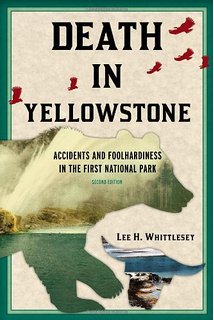
But do I worry when I take her into Yellowstone’s backcountry? You bet. I worry. Last summer I was awakened in the middle of the night by what sounded like a large animal snorting outside my tent, and immediately went into action, waking up all my camping companions (two families) by shouting, “Bear! Bear! Everybody up!” (It later turned out, to my chagrin, that I was probably awakened by one of my campmates’ loud snoring.) I always keep the pepper spray handy, knowing full well that there are many situations in which it would not be of much help. Do I want my family to end up like Leo DiCaprio in The Revenant (2015)? I do not. Here’s my intrepid camper at Heart Lake, doing her best Tom Hardy imitation.
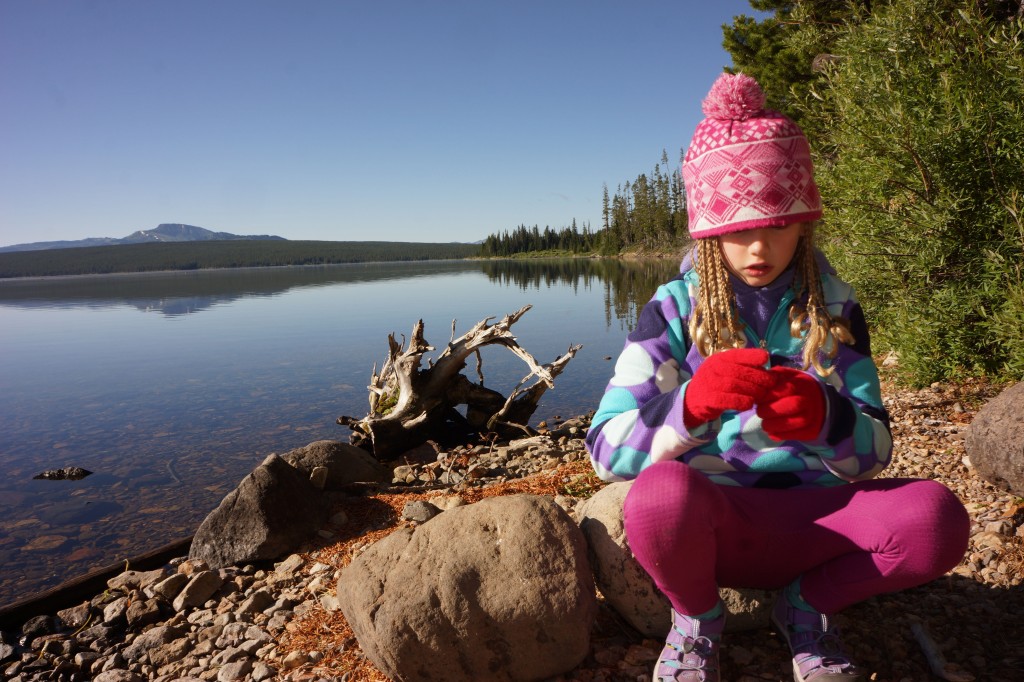
But . . . what? Should we stay home? Stay inside? Take up needlepoint, jigsaw puzzles? Or for my daughter, the glorious online seductions of AnimalJam and Minecraft? You can guess where I’m going with this: I love the outdoors and know the calculated risks of backpacking in grizzly country. Or whitewater rafting, during which you have to deal with the complex dynamics of rushing water. Three things stand out about the boy’s tragic death in Disaster Falls: It was the first day of their rafting trip; they tried something too risky for their skill level; and they weren’t comfortable with what they were doing, seemed to be trying to push themselves beyond their limits. It’s easy for me to say those are all mistakes, but I’ll also say I don’t judge the family one bit. It’s the old saw: There but for the grace of God go I.
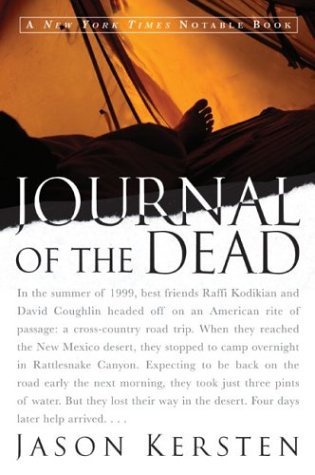
For those who are captivated by these “adventures gone wrong” tales, Jason Kersten’s Journal of the Dead (2003) is a heartbreaker. It basically describes the mystifying tragedy of two college friends, David Coughlin and Raffi Kodikian, whose overnight camping trip near Carlsbad Caverns National Park in New Mexico turned into a survival ordeal, one that ended with Kodikian stabbing Coughlin to death. Although there were theories about other motives, the truth of what actually happens seems fairly evident, through a preponderance of evidence: the two young men became disoriented, were lost in the desert, could not find the way back to their car, ran out of water and started to die of dehydration. Coughlin urged Kodikian to kill him, to put him out of his misery, and Kodikian did so. It’s bizarre, horrible, inexplicable . . . but true. And I should note this biographical tie-in: The incident took place in August 1999, and that semester I was teaching at Penn State. (Note that Kodikian grew up in a suburb of Philadelphia.) Talking to a writing class one day, I mentioned reading about the story in the news, and one of my students explained he knew Raffi Kodikian, and that Kodikian was a good person. I think that personal recommendation is what led me to read Journal of the Dead when I came across it, years later.
Ultimately Kersten’s description and analysis of the tragedy is both dramatic and sound. If there’s a connection between the tragedies of Disaster Falls and Journal of the Dead, it’s that both tragedies occurred in part due to the people being unfamiliar and new to what they were doing: In Gerson’s book it was whitewater rafting, and in Kersten’s it was desert hiking and camping. I’m going to continue adventuring in the West, and am already making kayaking and backpacking plans for next summer in Utah and in Grand Tetons National Park (grizzly country!), and although I’ll try to be as careful as possible, I know there will be risks. Still, adventure is worth it. Life itself is a risk.
Here’s my (then) nine-year-old daughter, Lili, paddling her own kayak last summer (going solo, upon which she insisted) at String Lake in the Grand Tetons National Park.
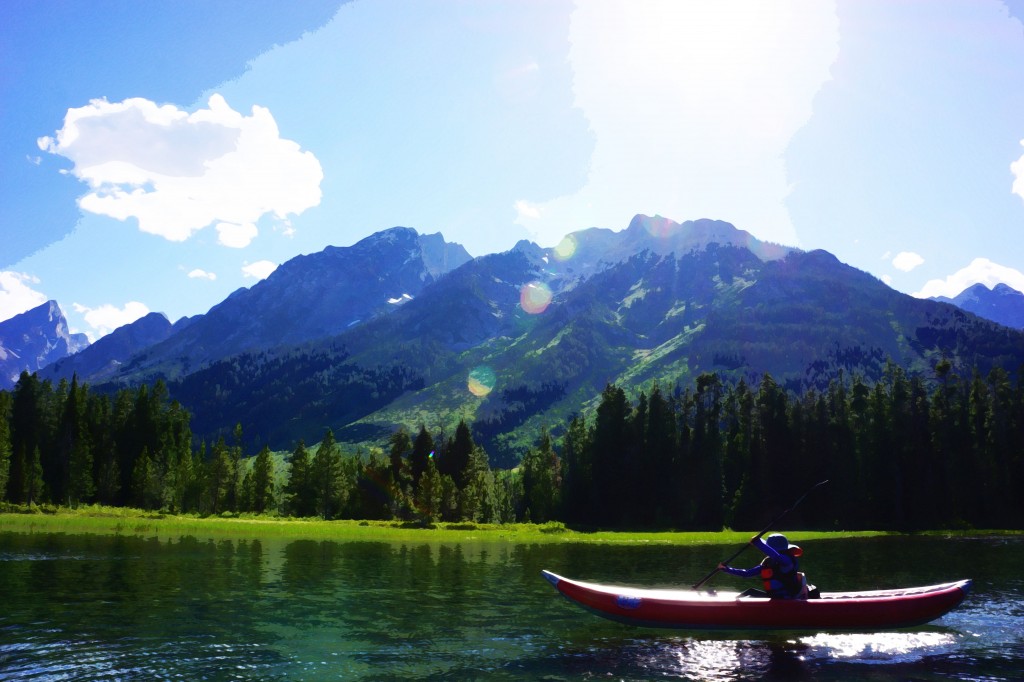
- February 2026
- January 2026
- November 2025
- October 2023
- September 2023
- September 2021
- April 2020
- September 2019
- May 2019
- August 2018
- February 2018
- January 2018
- October 2017
- August 2017
- June 2017
- May 2017
- March 2017
- February 2017
- November 2016
- October 2016
- May 2016
- April 2016
- March 2016
- February 2016
- January 2016
- November 2015
- October 2015
- September 2015
- June 2015
- May 2015
- April 2015
- March 2015
- December 2014
- September 2014
- August 2014
- May 2014
- March 2014
- February 2014
- January 2014
- December 2013
- November 2013
- October 2013
- September 2013
- August 2013
- July 2013
- June 2013
- May 2013
- April 2013
- March 2013
- February 2013
- January 2013
- December 2012
- November 2012
- October 2012
- September 2012
- August 2012
- July 2012
- June 2012
- May 2012
- April 2012
- March 2012
- February 2012
- January 2012
- December 2011
- November 2011
- October 2011
- September 2011
- August 2011
- July 2011
- June 2011
- May 2011
- April 2011
- March 2011
- February 2011
- January 2011
- December 2010
- November 2010
- October 2010
- September 2010
- August 2010
- July 2010
- June 2010
- May 2010
- April 2010
- March 2010
- February 2010
- January 2010
- December 2009
- November 2009
- October 2009
- September 2009
- August 2009
- July 2009
- June 2009
- May 2009
- April 2009
- March 2009
Recent Posts
- Rachel McAdams film “Send Help” (2026) Makes Comic Gold Out of “Survivor” and “Alone” Audition Videos
- “The Wiggle Room”: A Short Story
- On the New Film “Grizzly Night,” Based on the Nonfiction Book “Night of the Grizzly” (1971)
- The Alien-Hunting Wives: Trump’s Novel Solution to the Coming Alien Invasion
- On the Gerard Butler film “Greenland”: Maybe Trump Thinks It’s Real, Why He Wants the Icy Island?
Recent Comments
No comments to show.
